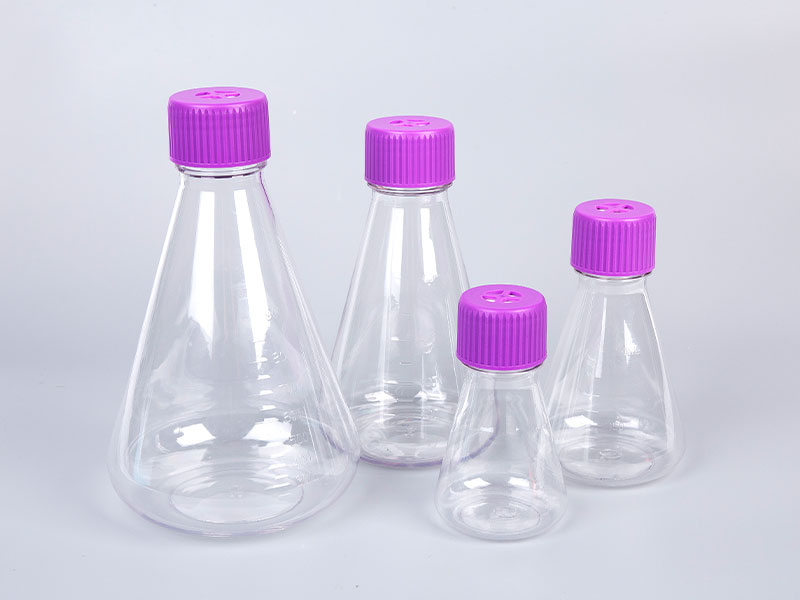Optimal Shaking Speeds for Cell Culture: A Guide for Bacteria, Animal, and Plant Cells
When working with the Bioland™ Cell Shaker, one of the most crucial factors in ensuring successful cell growth is understanding the ideal shaking speed and duration for different cell types. This versatility, combined with the high-quality construction of the shaker flasks, makes the Bioland™ system suitable for a broad range of applications, including bacterial cultures, animal cell growth, and plant cell suspensions. Each of these cell types has unique oxygen and nutrient requirements, which must be addressed through proper agitation conditions.
For bacterial cultures, especially in the early stages of growth, it’s essential to maintain a shaking speed that ensures optimal aeration without creating too much shear stress. Typically, a shaking speed between 150 and 250 rpm is ideal for bacterial growth. This range promotes sufficient oxygen transfer to support rapid cellular division while preventing the formation of clumps that could hinder growth. The duration of shaking depends on the specific bacterial species being cultured, but for most fast-growing bacteria, a shaking duration of 12 to 24 hours is sufficient for achieving high-density cultures. The Bioland™ Cell Shaker flasks, with their ability to provide excellent aeration, ensure that bacteria receive the oxygen needed for efficient metabolic processes, especially in the larger 500ml and 1000ml flasks where bacterial growth can reach higher densities.
Animal cells, in contrast, are more sensitive to physical stress due to their larger size and complex structure. Animal cells require gentle agitation to prevent shear forces that could cause cell damage or death. For these cells, such as mammalian or insect cell lines, the recommended shaking speed typically falls in the 60 to 150 rpm range. This gentle shaking ensures the cells remain in suspension and receive the nutrients and oxygen they need for optimal growth. However, higher shaking speeds could result in excessive mechanical stress, leading to poor cell viability and lower yields. For animal cell cultures, shaking durations vary based on the growth phase of the cells, but typically 24 to 72 hours of incubation with continuous shaking is recommended to achieve desired confluence or cell density. With Bioland™ Cell Shaker flasks, which are constructed from high-quality PETG for clarity, you can easily monitor cell growth and make any necessary adjustments.

Plant cells, particularly those used in research for tissue culture or suspension cultures, require a different approach due to their rigid cell walls and unique growth characteristics. The optimal shaking speed for plant cells generally ranges from 80 to 130 rpm, as this provides enough movement to facilitate nutrient distribution and gas exchange while being gentle enough to avoid damaging the cells. Plant cells, much like animal cells, are sensitive to shear forces, but they also benefit from a slightly faster shaking speed than animal cells to ensure that the thicker cell walls don't hinder efficient nutrient uptake. The shaking duration for plant cells can vary significantly based on the type of experiment, but typically 48 to 96 hours is required to obtain sufficient cell growth or biomass. The versatility of the Bioland™ Cell Shaker flasks, which come in various sizes and include both sealed and filter caps, helps maintain optimal conditions throughout the entire cultivation period, ensuring sterility and preventing contamination.
Ultimately, the ideal shaking speed and duration are determined by the specific needs of each cell type, and the Bioland™ Cell Shaker provides the flexibility to meet these needs. Bacteria, being faster-growing and less sensitive to mechanical stress, benefit from higher shaking speeds, while animal and plant cells, with their delicate structures, require gentler agitation to thrive. The precise control over shaking conditions offered by the Bioland™ system, combined with its sterile, RNase/DNase free, and pyrogen-free construction, guarantees that researchers can achieve optimal results across a wide variety of cell culture experiments. By understanding the unique needs of each cell type, you can ensure that your cultures grow efficiently and under the most favorable conditions, supporting reliable and reproducible results in your experiments.
For more information, please call us at +86-0571-87993109 or email us at hzbioland@126.com.
Aseptic vacuum filters, like Bioland™ disposable vacuum filtration units, are designed for high-effi...
Whether used in the food hygiene industry, water monitoring, or research labs, selecting the right m...
Narrow-mouth reagent bottles are essential tools in laboratories, offering precise storage solutions...
In laboratory diagnostics, particularly in PCR (Polymerase Chain Reaction) testing, efficiency is pa...
When working with the Bioland™ Cell Shaker, one of the most crucial factors in ensuring successful c...
Polymerase chain reaction (PCR) is one of the most vital techniques in molecular biology, allowing s...

 中文简体
中文简体 English
English Español
Español русский
русский











